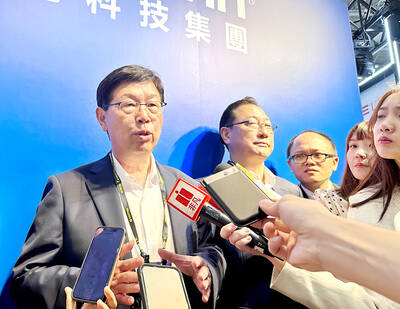Singapore’s central bank yesterday eased monetary policy as the city-state, seen as a bellwether for the health of global trade, heads for a deep recession due to the coronavirus pandemic.
The easing echoes moves made by other countries and comes after data last week showed the city-state suffered its sharpest contraction in the first quarter since the global financial crisis.
The Monetary Authority of Singapore (MAS), which uses the exchange rate as its main policy tool rather than a benchmark interest rate, recentered its currency band downwards and flattened the slope at which the Singapore dollar is allowed to move against a basket of currencies of its major trading partners to zero — effectively weakening the local unit.

Photo: Bloomberg
The MAS has never before taken those two steps at the same meeting.
All 16 economists in a Bloomberg survey projected the MAS would take that dual action.
“Major uncertainty remains. The recovery in the global economy will depend on the epidemiological course of the pandemic and the efficacy of policy responses,” the MAS said.
It was supposed to issue its next policy statement next month, but brought it forward as the country reels from the economic impact of the virus. Singapore is one of the world’s most open economies, and is usually hit hardest and earliest during any global shock.
GDP shrank by 2.2 percent in the first quarter compared with last year — the worst decline since the 2009 financial crisis, according to advance estimates released last week by the Singaporean Ministry of Trade and Industry.
The ministry downgraded its growth forecast, projecting GDP would fall by up to 4 percent this year.
With global demand hammered by business closures, a halt in air travel and other measures to contain the virus, Singapore’s easing is more to reflect the economic climate than to support exports, CIMB Private Banking economist Song Seng Wun (宋城煥) said.
“You cannot have a strong Singapore dollar when regional economies and the global economy are in deep recession,” he said.
Additional reporting by Bloomberg

Taiwan Transport and Storage Corp (TTS, 台灣通運倉儲) yesterday unveiled its first electric tractor unit — manufactured by Volvo Trucks — in a ceremony in Taipei, and said the unit would soon be used to transport cement produced by Taiwan Cement Corp (TCC, 台灣水泥). Both TTS and TCC belong to TCC International Holdings Ltd (台泥國際集團). With the electric tractor unit, the Taipei-based cement firm would become the first in Taiwan to use electric vehicles to transport construction materials. TTS chairman Koo Kung-yi (辜公怡), Volvo Trucks vice president of sales and marketing Johan Selven, TCC president Roman Cheng (程耀輝) and Taikoo Motors Group

Among the rows of vibrators, rubber torsos and leather harnesses at a Chinese sex toys exhibition in Shanghai this weekend, the beginnings of an artificial intelligence (AI)-driven shift in the industry quietly pulsed. China manufactures about 70 percent of the world’s sex toys, most of it the “hardware” on display at the fair — whether that be technicolor tentacled dildos or hyper-realistic personalized silicone dolls. Yet smart toys have been rising in popularity for some time. Many major European and US brands already offer tech-enhanced products that can enable long-distance love, monitor well-being and even bring people one step closer to

RECORD-BREAKING: TSMC’s net profit last quarter beat market expectations by expanding 8.9% and it was the best first-quarter profit in the chipmaker’s history Taiwan Semiconductor Manufacturing Co (TSMC, 台積電), which counts Nvidia Corp as a key customer, yesterday said that artificial intelligence (AI) server chip revenue is set to more than double this year from last year amid rising demand. The chipmaker expects the growth momentum to continue in the next five years with an annual compound growth rate of 50 percent, TSMC chief executive officer C.C. Wei (魏哲家) told investors yesterday. By 2028, AI chips’ contribution to revenue would climb to about 20 percent from a percentage in the low teens, Wei said. “Almost all the AI innovators are working with TSMC to address the

FUTURE PLANS: Although the electric vehicle market is getting more competitive, Hon Hai would stick to its goal of seizing a 5 percent share globally, Young Liu said Hon Hai Precision Industry Co (鴻海精密), a major iPhone assembler and supplier of artificial intelligence (AI) servers powered by Nvidia Corp’s chips, yesterday said it has introduced a rotating chief executive structure as part of the company’s efforts to cultivate future leaders and to enhance corporate governance. The 50-year-old contract electronics maker reported sizable revenue of NT$6.16 trillion (US$189.67 billion) last year. Hon Hai, also known as Foxconn Technology Group (富士康科技集團), has been under the control of one man almost since its inception. A rotating CEO system is a rarity among Taiwanese businesses. Hon Hai has given leaders of the company’s six